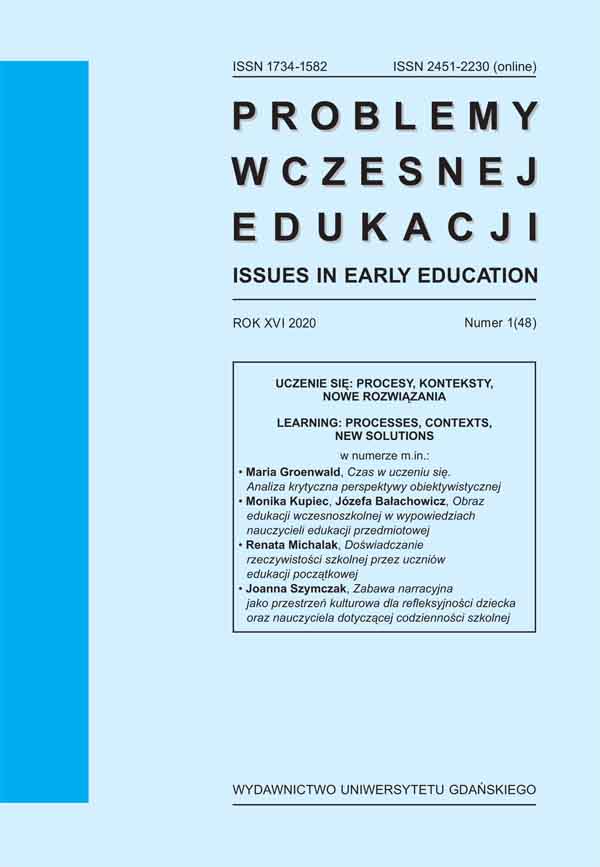The power of authority and the Montessori teachers’ (in)ability to learn – research intervention report
DOI:
https://doi.org/10.26881/pwe.2020.48.09Słowa kluczowe:
nauczyciele Montessori, metoda Montessori, osobista teoria nauczania, autorytet, kultury edukacyjneAbstrakt
The article concentrates on the issue of Montessori teachers’ attitude towards pedagogical knowledge they develop during different forms of training. The analysis presented in the text is based on quasi-experiment rooted in Critical Realism research paradigm. Eighty-two Montessori teachers participated in a workshop and were asked to comment on eight different quotes. Half of them knew that these extracts had been taken from the publications by Maria Montessori and the other half did not have that knowledge. As a result, the first group of teachers formulated numerous critical remarks whereas the other one concentrated on positive interpretations. This experiment might shed some light on the power of authority and limitations to transform teachers’ implicit pedagogical presuppositions. The teachers that took part in this experiment were provided with the opportunity to problematize their personal teaching theories.
Downloads
Bibliografia
Ball S.J. (2012), Performativity, Commodification and Commitment: An I-Spy Guide to the Neoliberal University. „British Journal of Educational Studies”, 60(1).
Barth R.S. (2002), The Culture Builder. „Beyond Instructional Leadership”, 59(8).
Baudson T.G., Preckel F. (2013), Teachers’ Implicit Personality Theories About the Gifted: An Experimental Approach. „School Psychology Quarterly”, 28(1).
Bhaskar R. (2008), A Realist Theory of Science. London–New York, Routledge.
Cook T.D. (1987), Quasi-Experimentation: Its Ontology, Epistemology, and Methodology, In: G. Morgan (ed.), Beyond Method. Strategies for Social Research. Beverly Hills, London, New Delhi, Sage Publications.
Doliński D., Grzyb T. (2019), The (doubtful) role of the financial reward in obedience to authority. „Journal of Social Psychology”, 159(4).
Duffy M., Duffy N. (2012), Love of Learning. Supporting Intrinsic Motivation in Montessori Stu-dents, Santa Rosa CA, Parent Child Press – A Division of Montessori Services.
Elbaz F. (1991), Research on teacher’s knowledge: the evolution of a discourse. „Journal of Cur-riculum Studies”, 23(1).
Fletcher J. (2012), Wisdom from the Inner Teacher: Turning Aha!s into OWL Moments – Optimal Wisdom Learning. North Charleston SC, McClain Productions.
Foucault M. (1979), What is an Author? „Screen”, 20(1). Fox D. (1983), Personal theories of teaching. „Studies in Higher Education”, 8(2).
Fraenkel J.R., Wallen N.E., Hyun H.H. (2012), How to design and evaluate research in education. New York, McGraw-Hill. Gray D.E. (2004), Doing Research in the Real Word. London, Sage Publications.
Hatch J.A., Freeman E.B. (1988), Kindergarten philosophies and practices: perspectives of teachers, principals and supervisors. „Early Childhood Research Quarterly”, 3(2).
Hogan P. (1988), Communicative Competence and Cultural Emancipation: reviewing the rationale for educational studies in teacher education. „Oxford Review of Education”, (14)2.
Hoy A.W., Davis H., Pape S.J. (2006), Teacher Knowledge and Beliefs, In: P.A. Alexander, P.H. Win-nie (eds.), Handbook of educational psychology, Mahwah NJ, Lawrence Erlbaum Associates Publishers.
Jendza J., Zamojski P. (2015), Privatizing Montessori. The Capitalization of Knowledge and the Inability to Renew Meanings. „Studia Pedagogiczne”, 28.
Kincheloe J.K. (2012), Teachers as Researchers. Qualitative inquiry as a path to empowerment. London–New York, Routledge.
Lakatos I., Feyerabend P. (1999), For and Against Method, In: M. Motterlini (ed.), Chicago & Lon-don, The University of Chicago Press. Lillard A.S. (2007), Montessori – The Science Behind the Genius. Oxford–New York, Oxford University Press.
Marshall Ch. (2017), Montessori education: a review of the evidence base, “npj Science of Learn-ing”, DOI: 10.1038/s41539-017-0012-7.
Milgram S. (1963), Behavioral study of obedience. “Journal of Abnormal and Social Psychology”, 67(4), DOI: 10.1037/h0040525, 2.12.2019.
Milgram S. (1973), The Perils of Obedience. “Harper’s Magazine”, 247(1483).Miller F.G., Wertheimer A. (2010), The ethics of consent: theory and practice. Oxford, Oxford University Press.
Montessori M. (1967), The Discovery of the Child. New York, The Random House Publishing Group.
Montessori M. (1972), The Secret of Childhood. New York, Balantine Books.
Montessori M. (1995), The Absorbent Mind. New York, Henry Holt and Company.Montessori M. (2009), The Child, Society and The World. Unpublished Speeches and Writings. Amsterdam, Montessori – Pierson Publishing Company.
Montessori M. (2014), The Child, Education for a New World. Amsterdam, Montessori – Pierson Publishing Company.
Runco M.A., Johnson D.J. (2002), Parents’ and teachers’ implicit theories of children’s creativity: A cross – cultural perspective. „Creativity Research Journal”, 14.
Spodek B. (1988), The implicit theories of early childhood teachers. „Early Childhood Develop-ment and Care”, 38.
Tripp D. (2012), Critical Incidents in Teaching – Developing professional judgement. London–New York, Routledge.
Wallace C.S. (2014), Overview of the Role of Teacher Beliefs in Science Education. In: R. Evans, J. Luft, Ch. Czerniak, C. Pea (eds.), The Role of Science Teachers’ Beliefs in International Classrooms. From Teacher Actions to Student Learning. Rotterdam, Sense Publishers.
Zamojski P. (2018), Cultural codes and education in Poland – a plea for a new educational imaginary. „Policy Futures in Education”, 16(4).

 Uniwersyteckie Czasopisma Naukowe
Uniwersyteckie Czasopisma Naukowe





